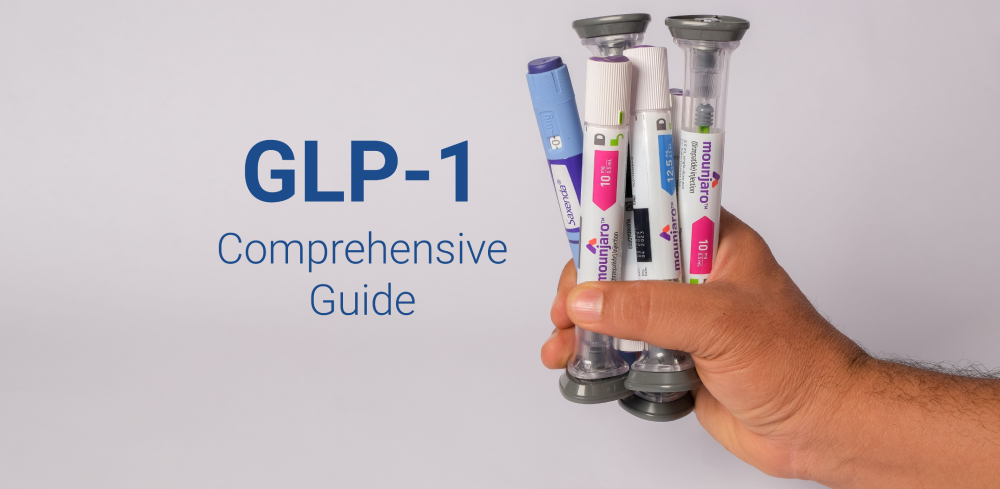
Tirzepatide: A Breakthrough in Weight Loss and Diabetes Management
Update Date July 19 2024


Eli Luft, PA-C
Dr. Paul Rivas
Key Takeaways
- Tirzepatide: A dual GIP/GLP-1 receptor agonist that decreases appetite and improves metabolic function.
- SURMOUNT Trials: Tirzepatide produced an average weight loss of up to 20.9% in people with obesity.
- SURPASS Trials: Superior HbA1c reductions and weight loss compared to other diabetes drugs.
- Long-term Treatment: Necessary to maintain weight loss due to the body’s weight-promoting physiology.
- Side Effects: Generally well-tolerated but can cause gastrointestinal issues that usually improve over time.
Introduction to Tirzepatide
Definition and Overview of Tirzepatide
Tirzepatide is a groundbreaking medication that has demonstrated significant efficacy in weight loss and type 2 diabetes management during clinical trials. It operates by activating two key gut hormones: Gastric Inhibitory Polypeptide (GIP) and Glucagon-Like Peptide-1 (GLP-1) [2]. These hormones play essential roles in controlling hunger, regulating blood sugar, and managing energy utilization in the body [1].
As an agonist for both GIP and GLP-1 receptors, tirzepatide mimics the actions of these natural incretin hormones. When we consume food, our intestines release GIP and GLP-1 to stimulate insulin secretion from pancreatic β cells, thus helping to maintain balanced blood sugar levels.
Tirzepatide helps reduce hunger and increase feelings of fullness. It also slows gastric emptying, which aids in better blood sugar control. This multifaceted approach prevents the common issue of weight regain that often accompanies traditional diets. Consequently, individuals using tirzepatide can achieve greater and more sustainable weight loss compared to those using treatments that target only one receptor [3].
Efficacy of Tirzepatide in Weight Loss
Results from the SURMOUNT-1 Trial
The SURMOUNT-1 trial showed how well tirzepatide can help adults with obesity lose weight. People taking the highest 15 mg dose lost about 21% of their body weight over 72 weeks. Those taking a placebo only lost about 3% [5]. More than one-third of people on the highest dose lost at least 25% of their weight.
The study found that higher doses of tirzepatide led to more weight loss. The 10 mg dose helped people lose about 19.5% of their weight, while the 5 mg dose led to about 15% weight loss [5]. This means doctors can adjust the dose based on what each patient needs and can handle.
Long-term Weight Loss Maintenance with Continued Tirzepatide Treatment
The SURMOUNT-4 trial showed why it’s important to keep taking tirzepatide to maintain weight loss. People who switched to a placebo after 36 weeks of tirzepatide gained back about 14% of their body weight. Those who kept taking the drug lost another 5.5% [3].
These results are similar to what we’ve seen with other weight loss drugs. When people stop taking them, they often gain weight back. Just like with high blood pressure or diabetes, obesity needs ongoing treatment. This is because the body tries to regain weight after losing it [3].
Tirzepatide helps fight the body’s attempts to regain weight. It does this by reducing hunger, making people feel full, and improving how the body processes food [4]. By continuing to take the drug, patients can keep the weight off and even lose more. This builds on the health benefits they’ve already gained from lifestyle changes and medication.
Tirzepatide’s Role in Type 2 Diabetes Management
Glycemic Control Improvements in the SURPASS Trials
Across the SURPASS clinical trials, tirzepatide consistently produced superior reductions in HbA1c compared to other diabetes medications, including insulin, sulfonylureas, and GLP-1 receptor agonists [6]. Participants taking tirzepatide achieved HbA1c decreases of up to 2.4%, indicating a profound improvement in glycemic control.
Importantly, these robust HbA1c reductions occurred alongside significant weight loss of up to 10.7 kg (23.6 lb) [7]. In contrast, treatment with insulin led to weight gain in the SURPASS trials. This highlights a key advantage of tirzepatide over traditional insulin therapy – the ability to enhance glycemic control while simultaneously promoting weight reduction.
Potential for Reducing Insulin Requirements in Patients with Type 2 Diabetes
By more comprehensively addressing the underlying metabolic dysfunction in type 2 diabetes, tirzepatide may enable patients to achieve their treatment goals with lower insulin doses or potentially eliminate the need for insulin entirely in some cases [6]. This could help decrease the number of daily injections, simplify medication routines, and improve quality of life.
As obesity continues to drive the increasing prevalence of insulin-requiring type 2 diabetes, the availability of tirzepatide as an effective therapy that can reduce insulin needs while inducing substantial weight loss may help alleviate the clinical and economic toll of this chronic disease [4].
Safety and Side Effects of Tirzepatide
Common Adverse Events Reported in Clinical Trials
The most common side effects of tirzepatide affect the stomach and gut. These include feeling sick, having diarrhea, throwing up, being constipated, and having stomach pain. These side effects are usually mild or moderate and often get better as treatment goes on [8]. Starting with a low dose and slowly increasing it helps reduce these stomach issues.
Some patients might have more serious side effects. These can include severe stomach problems or inflamed pancreas. If these happen, patients must stop taking the drug right away and see a doctor [1]. To help with stomach issues, patients can try eating smaller meals, avoiding foods that upset their stomach, taking the medicine at bedtime, and using drugs to help with nausea or diarrhea if needed [1].
Rare but Serious Potential Side Effects, such as Thyroid Tumors
Studies in animals show that tirzepatide and similar drugs can cause thyroid tumors and cancer. We don’t know if this risk applies to humans, but patients should watch for signs. These may include a lump or swelling in the neck, a hoarse voice, trouble swallowing, or breathing issues. People with a history of thyroid cancer or certain hormone disorders in their family should not use tirzepatide [4].
Future Directions and Implications
Ongoing Clinical Trials Investigating Tirzepatide’s Efficacy and Safety
Several clinical trials are currently underway to further evaluate the efficacy and safety of tirzepatide for obesity and type 2 diabetes. The SURMOUNT-MMO trial is assessing tirzepatide in conjunction with intensive lifestyle intervention, while SURMOUNT-NASH is studying its effects in patients with non-alcoholic steatohepatitis (NASH) [4]. Additional long-term safety and efficacy data will be provided by the SURPASS-CVOT trial, which is evaluating tirzepatide’s impact on cardiovascular outcomes in patients with type 2 diabetes [6].
Considerations for Long-term Use and Combination with Lifestyle Interventions
We need to learn more about using tirzepatide with diet and exercise. The SURMOUNT-3 study found that starting tirzepatide after a 12-week lifestyle program led to 21.1% more weight loss. In total, patients lost 26.6% of their weight from the start [9]. This shows that giving tirzepatide after patients lose some weight on their own might help boost and keep the health benefits. But we’re not sure yet how much ongoing support patients need to keep the weight off while using tirzepatide.
Studies show that tirzepatide is safe for long-term use in people with obesity [3]. Stomach issues are common side effects, but they’re usually mild and get better over time. Serious problems have been rare so far. There are no signs of higher risks for pancreas or thyroid cancer in humans yet. Still, we need to keep watching for long-term safety as more people use tirzepatide.
Conclusion
Tirzepatide is a big step forward in treating obesity and type 2 diabetes. It works in a new way that sets it apart from other treatments. This drug helps people lose a lot of weight and improves their health. It’s safe and works well for long-term weight control. Tirzepatide gives new hope to the many Americans dealing with obesity and its health problems.
At Rivas Medical Weight Loss, we’re excited to use tirzepatide in our weight loss programs. Our skilled doctors work with each patient to make a plan just for them. We combine drugs like tirzepatide with diet, exercise, and behavior tips to help patients lose weight and keep it off. To find out how tirzepatide could
help you lose weight, book an appointment with us today.

Lose Weight. Feel Great.
Rivas Medical Weight Loss is here to guide you
with expert care and top quality medication.
Book Appointment
Bibliography
- https://www.nejm.org/doi/full/10.1056/NEJMoa2206038
- https://www.ncbi.nlm.nih.gov/pmc/articles/PMC4020673/
- https://jamanetwork.com/journals/jama/fullarticle/2812936
- https://www.fda.gov/news-events/press-announcements/fda-approves-new-medication-chronic-weight-management
- https://investor.lilly.com/news-releases/news-release-details/fda-approves-lillys-zepboundtm-tirzepatide-chronic-weight
- https://investor.lilly.com/news-releases/news-release-details/tirzepatide-demonstrated-significant-and-superior-weight-loss
- https://www.ajmc.com/view/fda-approves-diabetes-drug-tirzepatide-for-chronic-weight-management
- https://www.medscape.com/viewarticle/998225
- https://www.nature.com/articles/s41591-023-02597-w





